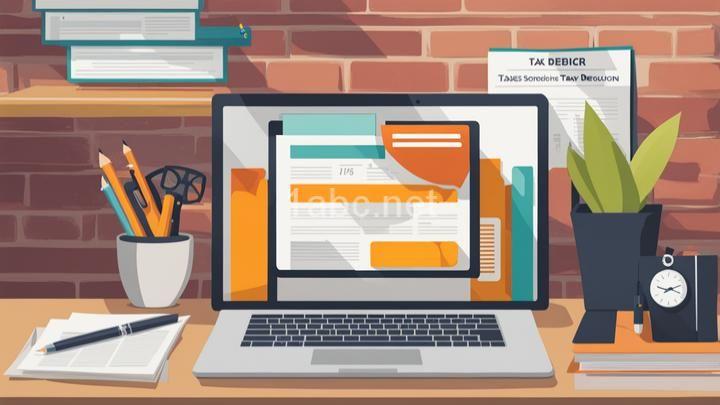Maximizing Tax Deductions as a Freelancer: A Comprehensive Guide

Introduction:
Welcome readers and establish the importance of maximizing tax deductions as a freelancer. As a freelancer, you have the freedom to work on your own terms and pursue your passions. However, along with this flexibility comes the responsibility of managing your finances and taxes. Maximizing tax deductions can help you save money and reduce your tax liability, allowing you to keep more of your hard-earned income. In this comprehensive guide, we will delve into the world of tax deductions for freelancers, providing you with the knowledge and strategies to optimize your deductions and make the most of your freelance business.
I. Understanding Tax Deductions for Freelancers:
Tax deductions are expenses that freelancers can subtract from their taxable income, reducing the amount of income that is subject to taxation. Unlike tax credits, which directly reduce the amount of tax owed, deductions lower your taxable income, resulting in a lower tax liability. This can be especially advantageous for freelancers who often have various business expenses. By taking advantage of these deductions, you can lower your tax bill and keep more money in your pocket.
To give you an idea of the deductions available to freelancers, here are some common examples:
- Home office expenses: If you have a dedicated space in your home used solely for your freelance business, you may be eligible for a home office deduction.
- Office supplies: Any costs associated with purchasing office supplies, such as pens, paper, and printer ink, can be deducted.
- Professional development: Expenses related to improving your skills and knowledge, such as attending conferences or taking online courses, may be deductible.
- Travel expenses: If you travel for business purposes, such as meeting clients or attending industry events, you can deduct your travel expenses, including airfare, accommodations, and meals.
- Marketing and advertising: Costs incurred for promoting your freelance business, such as website development, advertising, and business cards, can be deducted.
- Health insurance premiums: Freelancers who pay for their health insurance premiums may be able to deduct these expenses.
II. Organizing Your Finances:
Keeping track of your income, expenses, and receipts throughout the year is crucial for maximizing your tax deductions as a freelancer.
By maintaining organized financial records, you can easily identify deductible expenses and ensure accurate reporting on your tax return. Here are some tips to help you stay organized:
- Use accounting software: Consider using accounting software specifically designed for freelancers to track your income and expenses. These tools can streamline the process and provide you with a clear overview of your financial situation.
- Hire a bookkeeper: If managing your finances becomes overwhelming, it might be worth hiring a bookkeeper to handle the day-to-day tasks. They can help you maintain accurate records, ensuring that you don't miss any deductions.
- Separate personal and business finances: Create separate bank accounts and credit cards for your freelance business. This separation will make it easier to track your business expenses and simplify the recordkeeping process.
III. Eligible Business Expenses:
As a freelancer, you can deduct various types of business expenses from your taxes. Here are some categories to consider when identifying potential deductions:
- Office expenses: This includes costs related to your workspace, such as rent, utilities, and internet fees.
- Equipment and supplies: Any equipment you purchase for your freelance business, such as computers, cameras, or software, can be deductible. Additionally, supplies like paper, ink, and postage can also be included.
- Professional services: Fees paid to lawyers, accountants, and other professionals who provide services directly related to your freelance business can be deducted.
- Advertising and marketing: Expenses incurred for advertising your services, such as website development, online ads, or promotional materials, are deductible.
- Travel and transportation: If you need to travel for work, expenses like airfare, accommodations, meals, and transportation costs can be deducted.
- Professional development: The costs associated with improving your skills and knowledge, such as attending workshops, conferences, or purchasing educational materials, can be deductible.
IV. Home Office Deduction:
For many freelancers, working from home is a common practice. If you use a dedicated space in your home exclusively for your freelance business, you may be eligible for a home office deduction. To qualify for this deduction, the space must be used regularly and exclusively for your business activities. Here are some important points to consider:
- Exclusive use: The space you claim as a home office must be used solely for your business. It cannot be used for personal purposes, such as a guest room or a play area for your children.
- Regular use: The space should be used consistently for your business activities. Occasional use or sporadic work from home may not meet the regular use requirement.
- Calculating the deduction: There are two methods for calculating the home office deduction: the simplified method and the regular method. The simplified method allows you to deduct a set amount per square foot of your home office space, while the regular method involves calculating the actual expenses associated with your home office.
It's important to note that the home office deduction can be a red flag for audits, so be sure to keep detailed records and follow the IRS guidelines carefully.
V. Self-Employment Taxes:
As a freelancer, you are responsible for paying self-employment taxes, which consist of the Social Security and Medicare taxes that are typically withheld from an employee's paycheck. Unlike traditional employees who split these taxes with their employer, freelancers must pay both the employee and employer portions themselves. Here are a few key points to understand about self-employment taxes:
- Self-employment tax rate: The self-employment tax rate for freelancers is currently 15.3%. This rate is applied to your net self-employment income, which is your total income minus any allowable deductions.
- Estimated tax payments: Freelancers are generally required to make estimated tax payments throughout the year to cover their self-employment taxes. It's important to calculate and pay these estimated taxes to avoid penalties and interest.
- Deducting self-employment taxes: The good news is that freelancers can deduct the employer portion of their self-employment taxes as a business expense. This deduction helps offset the burden of paying both portions of these taxes.
VI. Hiring Professional Help:
Navigating the world of taxes can be complex, especially for freelancers with unique business expenses. While it's possible to handle your taxes on your own, there are times when hiring an accountant or tax professional can be beneficial. Here are a few situations where professional help may be valuable:
- Complex tax situations: If you have multiple sources of freelance income, significant business expenses, or face other complexities, a tax professional can help you navigate the complexities of your tax situation.
- Time-saving: As a freelancer, your time is valuable. Hiring a tax professional can free up your time to focus on your freelance work while ensuring accurate and timely tax filings.
- Expert advice: Tax laws and regulations can change frequently. A tax professional stays up-to-date with these changes and can provide you with valuable advice on maximizing deductions and minimizing your tax liability.
- Audit support: If you are audited by the IRS, having a tax professional on your side can provide peace of mind and expert guidance throughout the process.
When hiring a tax professional, it's important to find someone who is experienced with freelance taxation and understands the unique challenges and opportunities that freelancers face.
VII. Recordkeeping and Documentation:
Accurate recordkeeping and proper documentation are essential for supporting your tax deductions. Here are some guidelines to follow:
- Keep receipts: Keep all receipts for business expenses, such as office supplies, equipment purchases, and travel expenses. These receipts will serve as proof of your expenses and support your deductions.
- Track mileage: If you use your vehicle for business purposes, keep a mileage log to track your business-related mileage. This log will be necessary if you plan to deduct your transportation expenses.
- Invoice and payment records: Maintain a record of all your invoices and payments received to track your income accurately.
- Store documents securely: Consider using cloud storage or a physical filing system to store your documents securely. This will make it easier to access them when needed and ensure that you have a backup in case of loss or damage.
Conclusion:
Maximizing tax deductions as a freelancer is an essential step towards financial success. By understanding the tax deductions available to you, organizing your finances, and keeping accurate records, you can optimize your deductions and reduce your tax liability. Remember to consult with a tax professional for personalized advice and guidance tailored to your unique situation. By implementing the strategies outlined in this comprehensive guide, you'll be well on your way to maximizing your tax deductions and keeping more of your hard-earned income in your pocket. Don't let the daunting world of taxes hold you back from your freelance dreams. Take control of your finances and make the most of your freelance business. Happy deducting!
FREQUENTLY ASKED QUESTIONS
What is the purpose of this guide?
The purpose of this guide is to provide you with valuable information and guidance on various topics. Whether you're looking for tips on personal growth, advice on relationships, or support in navigating life's challenges, this guide aims to offer practical insights and strategies to help you lead a fulfilling and meaningful life. It is designed to serve as a resource that empowers you to make informed decisions, overcome obstacles, and achieve your goals. By providing a mix of informative content and actionable steps, this guide strives to be a helpful companion in your journey towards personal development and well-being.
Why are tax deductions important for freelancers?
Tax deductions are important for freelancers because they can help reduce their taxable income. As a freelancer, you have the opportunity to deduct certain business-related expenses from your income, which can ultimately lower the amount of taxes you owe. This is especially beneficial since freelancers are responsible for paying both the employer and employee portions of Social Security and Medicare taxes.By taking advantage of tax deductions, freelancers can offset the costs of running their businesses. Some common deductions for freelancers include office expenses, computer equipment, professional development courses, marketing and advertising costs, and even a portion of their home office expenses if they work from home.
These deductions can add up and significantly reduce your tax liability. They allow you to keep more of your hard-earned money and reinvest it back into your business. It's important to keep detailed records and receipts for all your business expenses to ensure you can properly claim these deductions.
Overall, tax deductions are a valuable tool for freelancers to help minimize their tax burden and maximize their financial well-being. It's important to consult with a tax professional or accountant to ensure you are taking advantage of all the deductions available to you and staying compliant with tax laws.
What kind of deductions are available to freelancers?
As a freelancer, you may be eligible for various deductions that can help reduce your taxable income. Here are some common deductions available to freelancers:
-
Home Office Expenses: If you use a dedicated space in your home for your freelance work, you may be able to deduct a portion of your rent or mortgage, utilities, and other related expenses.
-
Business Supplies: Any supplies you purchase specifically for your freelance work, such as stationery, computer software, or equipment, can be deducted as business expenses.
-
Professional Services: Fees paid to professionals like accountants or lawyers who assist with your freelance business can be deducted.
-
Travel Expenses: If you travel for business purposes, such as attending conferences or meeting clients, you can deduct your transportation costs, accommodation, meals, and other related expenses.
-
Health Insurance Premiums: Freelancers who pay for their own health insurance may be able to deduct the premiums.
-
Self-Employment Taxes: As a freelancer, you are responsible for paying both the employer and employee portions of Social Security and Medicare taxes. You can deduct the employer portion of these taxes.
-
Website and Marketing Expenses: Any expenses related to maintaining a website or promoting your freelance business, such as website hosting fees, domain registrations, or advertising costs, can be deducted.
It's important to note that tax laws can vary depending on your location, so it's advisable to consult with a tax professional or accountant to ensure you're taking advantage of all the deductions available to you.
How can this guide help me maximize my tax deductions?
This guide can help you maximize your tax deductions by providing you with valuable information and strategies to make the most of the deductions available to you. It will walk you through the various deductions that you may be eligible for, such as business expenses, education expenses, charitable contributions, and more. Additionally, it will provide tips on how to keep accurate records and documentation to support your deductions and avoid any potential audits or penalties. By following the advice and guidance in this guide, you can ensure that you are taking advantage of all the deductions you are entitled to, ultimately reducing your tax liability and maximizing your tax savings.




